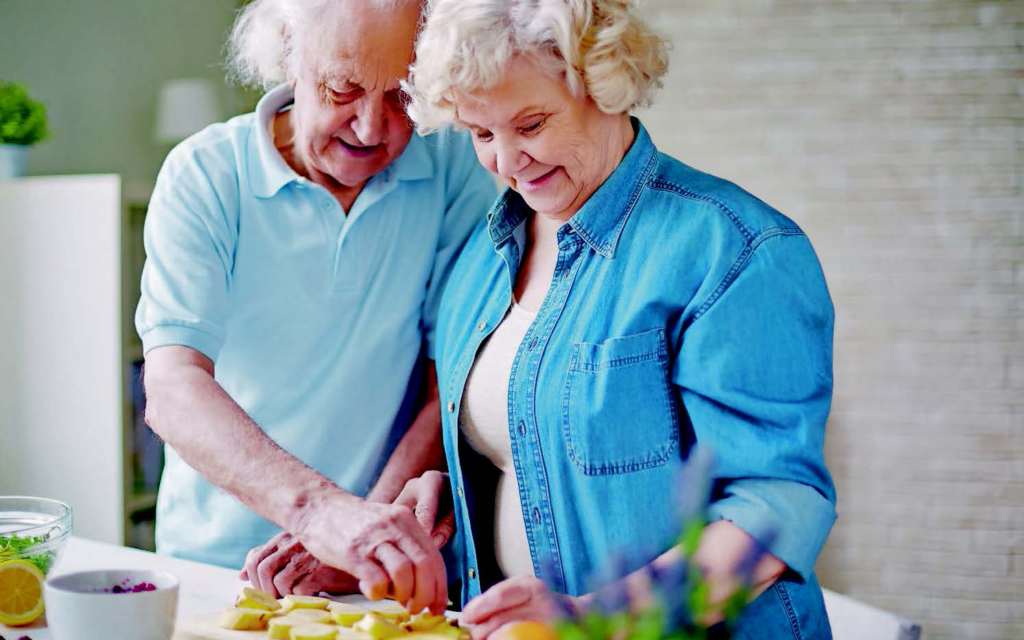10 nutrition myths for seniors
As our body changes, so do our nutritional needs. Dietitian Ngaire Hobbins debunks 10 common myths on senior nutrition to help you get the most out of your golden years.
1. Your stomach shrinks as you get older
Although your appetite and your capacity to eat may change, your stomach doesn’t shrink when you get older. In fact, not eating well enough only accelerates the ageing process.
2. Weight loss is healthy
Unfortunately, this is not the case when we are older. Dieting and unintentional weight loss should be avoided in the later years. Any weight loss should be a natural result of combining good exercise with an eating plan rich in protein. In fact, a bit of extra padding in later age is beneficial to support your body and brain in the years ahead.
3. You need to eat less as you get older
Whilst your metabolism slows and your energy output decreases, food and eating is what protects and fuels you. It is your key to ageing well. You may need to eat less of some things, but your body will need more of others, particularly foods rich in protein, vitamins and minerals.
4. Only eat what you feel like
The ageing process can play tricks on our appetite and the triggers that tell us if we are hungry or full. As a result, older people might eat less than their bodies really need. It’s important to realise the vital importance of continuing to eat despite the tricks, so your body continues to get the energy and nutrients it needs to function. An outright loss of appetite is not normal, and could be symptomatic of an underlying health problem. If you are having problems, try to eat small meals regularly throughout the day, even if you don’t always feel like it.
5. You need a low-fat diet
Contrary to deeply entrenched popular opinion, a low-fat diet is not always the best, especially for older people. Fat is an important source of calories and some seniors might need to eat a bit extra to maintain weight. For most however, eating foods containing mostly unsaturated fats is best for heart, body and brain health. Fats found in foods such as olive oil, nuts, seeds, avocado, and oily fish are ideal.
6. Eat more vegetables
Whilst nutrient-rich vegetables continue to be essential in your diet, protein foods need to be at the centre of your plate, with the vegetables surrounding it from now on. That’s because you need more, not less, protein as you get older. Protein keeps our muscles, our immune system, our body organs and brains, all our systems working and renewing minute by minute. Vegetables are always important, but if your appetite is small, ensure you get the protein in first, then enjoy the vegetables.
7. You only need to drink water when you’re thirsty
If you feel thirsty you are already a bit dehydrated and that’s a problem as neither your body nor your brain can work at peak capacity if you are dehydrated. Dehydration can bring on confusion, delirium, hampers kidney function and worsens a multitude of other conditions that commonly affect older people. Seniors tend not to sense thirst as
efficiently and are therefore at greater risk of dehydration, making fluid intake an essential element of overall nutrition.
8. Supplements are sufficient
Of course we can’t live off vitamins and supplement tablets alone. Your body works best when it is working – that means eating and digesting food. What’s more, most supplements promoted to help you live longer, boost memory, fight off dementia and more, fail to live up to their claims. And there’s another problem – many supplements interact with common medications or just don’t work the way they would if you ate them in the food they originally came from. You could spend a lot of money for no gain when you could do better by simply eating. Not only that, but you would miss out on one of life’s greatest pleasures – cooking and eating with family and friends.
9. You must always eat a ‘proper meal’
Making sure you eat regularly is essential to help you live well and remain independent as you age. However, eating three full meals a day can be a struggle if you have a loss of appetite or find cooking too difficult or time-consuming. You may opt for pre-packed meals, frozen dinners or take-away foods, but some of these don’t contain the protein and other nutrients especially important to support ageing bodies and brains, and others are high in sodium or saturated fats. If three good meals are too much of a challenge, 5 or 6 small meals or well-chosen snacks that are nutritious can be just as beneficial.
10. Malnutrition is part of getting older
Malnutrition can affect anyone, at any age and it is not a normal part of the ageing process. However, seniors are at greater risk of malnutrition and it’s important that you don’t dismiss the warning signs as being a part of “old age”.
Ngaire Hobbins, in collaboration with Home Instead Senior Care, recently released Nutrition for Seniors: a guide to healthy habits for eating well as you age. For more information and advice on maintaining a nutritional diet in the later years, download the guide.
Promotional feature
Get The AJN Newsletter by email and never miss our top stories Free Sign Up


comments